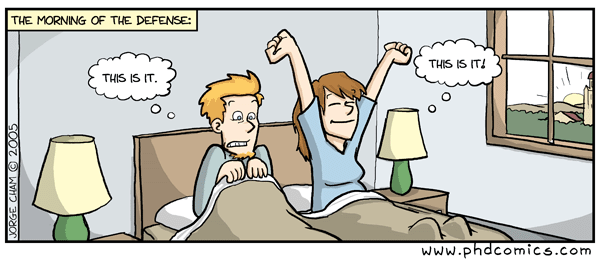
Becoming a Doctor from your Desk: Tips on Conquering a Doctoral Defence Remotely
By Ameera Ali

A doctoral defence can undoubtedly be a nerve-wracking experience regardless of whether it takes place in a face-to-face or remote context. In any case, however, it can also be an incredibly edifying and enjoyable process. In this blog post, I share some reflections and tips on how to conquer a dissertation defence remotely; an endeavour that has hitherto been seldom discussed, yet is becoming increasingly prevalent due to the recent transition to remote teaching and learning.
Rather than suggesting a list of universal guidelines that all should follow, I propose a set of practices that I found to be effective as I traversed my own remote doctoral defence at a time when this was unchartered territory for many. It should be noted that although this post is entitled becoming a ‘doctor’, it is my hope that the tips I provide will also be useful for Master’s students who are also embarking on the remote defence experience.
Find a Connection
As one approaches the defence stage, it can be difficult to decide how to begin preparation. A first step that I found to be helpful in sparking my own preparation was connecting with others to garner preliminary insights. Do you know someone who has already completed a defence (virtually or not)? Do you know any colleagues who will also be defending soon? Has anyone on your dissertation committee supervised any other students who have defended remotely? Speaking to others who have either directly been through this experience or have guided others through the experience can be an effective way of learning of others’ experiences and the similarities and differences between them. Additionally, connecting with someone who is also planning to embark on this experience in the near future can provide you with opportunities navigate the experience together. If you do not have any personal contacts, ask a faculty member or your Graduate Program Assistant/Director to connect you with other graduate students who are at a similar stage or have already completed the process.
Seek Guidance
As a fitting segue from the point above, seeking guidance from your supervisor and/or supervisory committee members can also be very useful. In addition to asking them to connect you with others, ensure that you also connect with them. Ask them what you might expect of them at the defence and what their expectations are of you. Make a list of questions you have and ensure that you go through the details and steps regarding the logistics of the process. I was fortunate enough to have had an exceptional supervisor who mentored me through each step of the way and made time to check-in with me regularly, but of course not every student will have such an experience. In any case, remember, your committee’s role is to support you, so please ensure that you receive the support you need. On this note, a large benefit of having a virtual defence is that this opens up possibilities regarding your examining committee as travel will likely not be an issue. This can certainly make it easier for you to curate a solid committee and for you to secure your ‘first choices’.
Attend a Defence
If you have already attended an in-person defence, you can definitely use this experience to gauge what you might anticipate for your virtual defence by familiarizing yourself with the process at large. Attending an actual virtual defence, however, is most ideal as this can really give you a sense of what the virtual experience is like. If attending a virtual defence is not a possibility for you, you might consider attending or presenting a virtual talk or conference session. Although not entirely the same, the format is quite similar to that of a defence: a presentation followed by a question/answer period; albeit with significantly lower stakes, of course. Nevertheless, observing this dynamic can give you a sense of what a remote professional setting is like. If none of this is possible, it is also helpful to draw on your own previous experiences. If you are a Doctoral student who has formerly defended your Master’s thesis, use this experience to reflect on what the process was like and gauge what might be different this time as you defend virtually.
Practice, Practice, and Practice Some More!
A virtual defence tends to be easier to simulate than one that is face-to-face so be sure to take advantage of this benefit. Hold a ‘mock’ defence with your colleagues or friends and have them ask you a series of questions so that you can better anticipate what the experience will feel like.
This is also helpful in becoming better familiar with the platform or program you will be using for the defence. Record yourself practicing to see what you look like: do you look directly at the camera when giving your presentation? Are you exhibiting any avoidable nervous behaviour (for me it was always the excessive “umm”s)? Are you speaking too quickly or too slowly? Through practice and re-practice you will get a better sense of the process as well as areas of strength and areas for improvement.
Prepare for the Un/expected
Some general suggestions for the day of the defence would be to:
- ‘Test’ that you are able to join your defence meeting by logging in early
- Ensure that your devices are charged and plugged into a power source
- Confirm that you have your supervisor’s emergency contact information handy
- Keep a notepad nearby for note-taking
- Ensure you are adequately nourished and hydrated
But, what will you do if your power or internet connection is suddenly lost? What will you do if you experience unanticipated challenges with your device? What happens if there is construction outside of your home on the day of your defence? These questions are not meant to provoke fear, but rather to raise awareness to the fact that challenges can arise and that it is always wise to be prepared for these. Having a backup plan can go a long way in both easing your apprehension as well as preparing you for a defence against all odds. Be sure to speak to your supervisor and committee members about what a ‘Plan B’ would entail in the event that unexpected situations arise.
Secure a Defence Space
Being in a comfortable space for your defence is certainly key. While you would ideally want a professional space with adequate lighting, a simple background, fast/unlimited internet, and minimal noise or distractions, the accessibility of these elements will vary for everyone. Work with what you have and ensure that you find a space that is most comfortable for you. It is often taken for granted that the university itself can be a source of access and safety for students; thus, if the university itself is inaccessible, this can certainly create challenges. If any of the ‘requirements’ for your defence are not accessible for you (e.g. access to a device, access to the internet, access to a safe space) do not hesitate to communicate this to your committee, department, and/or accessibility office to ensure that you receive the supports and resources you need for a successful and equitable defence.
Dress the Part
It may seem strange to ‘dress-up’ if you will not be leaving your home for the defence, but this seemingly small step can make a world of difference. Dressing-up can make it easier for you to get into the spirit of the defence and provide you with a boost in confidence. This does not mean you should necessarily wear a ‘power outfit’ if you do not want to; rather, it is a good idea to wear something that will make you feel confident and comfortable going into the defence. And remember, in most cases you will only be visible upwards from your shoulders or chest, so if you decide to pair your blazer with a comfortable pair of sweat pants, no one will know but you.
Take Advantage of the Perks:
- Invite friends, family, and/or colleagues to your defence (pending a conversation with your committee, of course). A large benefit of a virtual defence is that you can (ideally) have people attend from anywhere in the world— no plane ticket required! You may want to establish a system for attendees that will make you most comfortable (e.g. microphones muted and videos off).
- Make use of the chat. If you are using a platform that facilitates a chat function (e.g. Zoom), this can be a great tool to use. You can even ask your examining committee to place their questions in the chat as they ask them to help take off the pressure of remembering the details of what they ask.
- Ask your committee to allow for brief sporadic breaks throughout the defence, so that you may use the bathroom or take a moment to breathe if you need it. Doing this virtually comes with the benefit of being able to turn off your video and having a moment to yourself.
- Take advantage of technological features. At my defence, my committee recorded the moment I was brought back into the room and given my results. We also took a group screenshot as a memento. Acts as such go a long way in making the defence experience a memorable one.
Celebrate (safely)!
Lastly—and surely most importantly— celebrate! You may not be able to celebrate in the exact way you would like to, but do not let that take away from your celebratory festivities. Celebration will look different for everyone, so whether you host a Zoom party or simply take a nap to recover, celebrate in a way that makes you happiest!
As initially stated, the defence is a momentous occasion that is sure to bring on both trials and triumphs. By defending your dissertation remotely, you may miss out on the experience of a traditional defence, the thrill of shaking hands with your committee as they welcome you back to the room with your results, and the customary lunch with your supervisor following the defence. However, you gain the benefit of having a new experience which allows you the choice to invite loved ones who may not have been able to attend otherwise, the option to record the moment you become a doctor, and the ability to experience this from your own home—the hand shaking and lunches can always come at a later time. For those of you who are close to an impending defence, congratulations on getting to this point! You have worked so hard for this moment and regardless of where you defend from, this remains a pivotal moment in your life. Lights, camera, action… doctor!
About the Author
Ameera Ali is a Post-Doctoral researcher in York University’s Teaching Commons. Her former research has explored university students’ perspectives on accessibility in teaching and learning in higher education, while her Post-Doctoral research utilizes an intersectional lens to investigate students’ experiences of the transition to remote teaching and learning during the COVID-19 pandemic.
